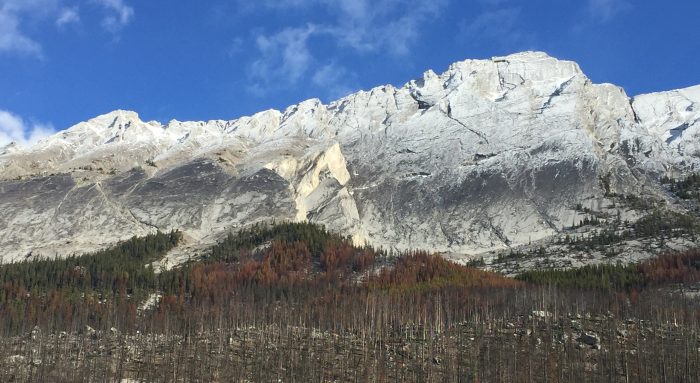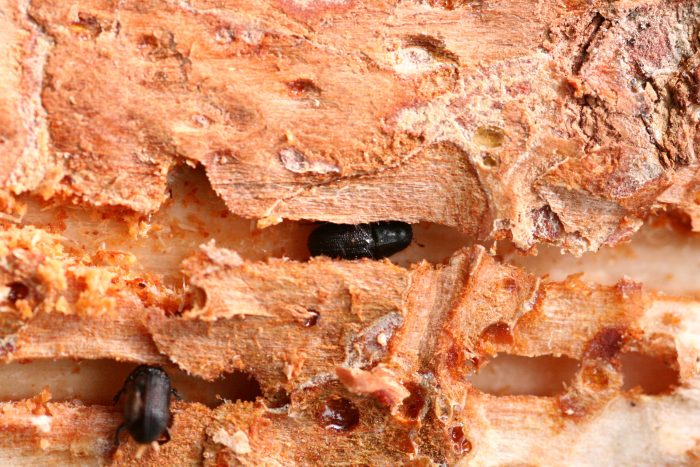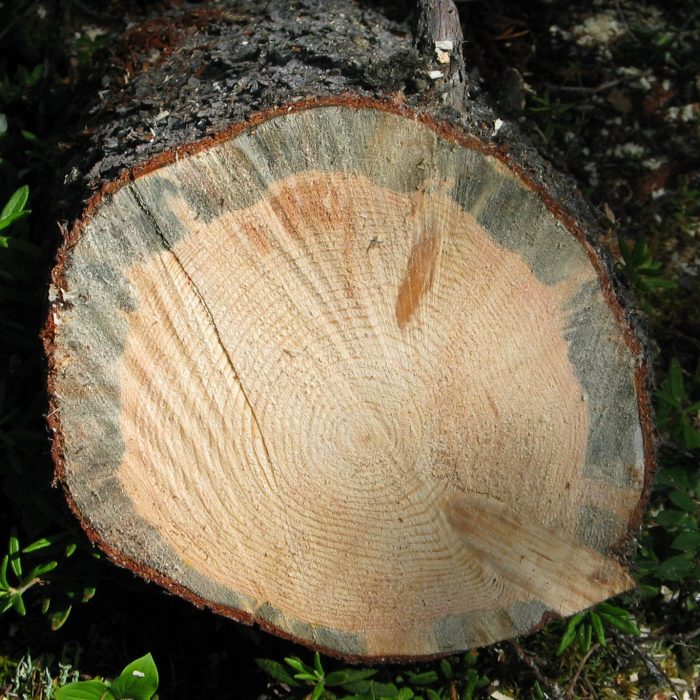Forecast for the 2016-17 winter season? Colder than usual, at least according to the Farmer’s Almanac. While this may fill weathered Albertans with dread, it could be good news for the mountain pine beetles that are spreading across the province at an alarming rate. Anyone who spends time driving through the boreal forest or mountain parks has noticed the increasing number of red or grey beetle killed trees.
While mountain pine beetle has been observed in small outbreaks in Alberta since 1941, it really wasn’t until the early 2000s that it became a significant problem. Mild winters and favorable winds aided the spread eastward from British Columbia over the Rocky Mountains and into Alberta. Additionally, decades of fire suppression and changing climate norms have allowed the mountain pine beetle to become established in forests that would have traditionally been able to fight off major infestations.

What does mountain pine beetle really do?
The mountain pine beetle infests pine trees to carry out its life cycle, from breeding and egg laying to eventual maturation and emergence as an adult. This in itself isn’t enough to necessarily kill the tree, but the combination of the beetle and a fungus that the beetles bring with them is. Infested trees develop blue coloured wood, indicative of the blue stain fungus that is carried from tree to tree with the beetle. Mountain pine beetle kills trees by clogging and destroying the connective tissue of the tree through the introduction of this blue stain fungus. They use this fungus to make the tree more habitable and to feed new adults, while the larvae feed on the phloem of the tree. The combined effect of blue stain fungus and larval feeding decreases the overall health of the tree and impedes the ability to transport water and nutrients, leading to tree death in as little as one month.


Mountain pine beetle traditionally infests lodgepole pine, but is now observed reproducing in jack pines, an abundant boreal species across Alberta and the Canadian boreal forests. If mountain pine beetle reaches levels of infestation similar to British Columbia, effects to the ecosystem, timber supply, and watershed will be observed.
Now why is a cold winter a good thing? Extended periods of cold weather, around -40°C, either early or late in the winter, freezes and kills beetle populations. The last few winters haven’t been cool enough to cull the population, but if the long term forecasts are correct, this winter may be exactly what is needed.
What is Alberta doing?
Alright, so the beetles are here and we can’t ask them nicely to leave, so what can be done? A mountain pine beetle action plan has existed in the province since 2007, and more recently a management plan was released specifically for Jasper National Park. While land management differs between national parks and the province as a whole, the approaches to dealing with mountain pine beetle are similar.
Short term plans to mitigate the impact include containing the infestation and minimizing the spread through single tree or block harvesting with activities such as burning or grinding. Long term strategies essentially include increasing overall forest health, thereby decreasing the number of trees that are susceptible to mountain pine beetle infestation. Decreasing the number of 80-120 year old trees by 75% and replacing them with young vigorous forests will aid in creating future forests that can fight off large scale infestations.
Forest tenure holders, such as forestry companies, aid in carrying out these plans through salvage activities that serve to improve forest health, create revenue for the province, and protect watersheds and terrestrial ecosystems. While the forest industry is able to use mountain pine beetle infested timber, there are a number of problems associated with it. Some include accessibility and ability to harvest before it decomposes, increased wood brittleness, and consumer market resistance.
Thoughts?
So what do you think? Should we try to control the spread of mountain pine beetle? Or let an indigenous species live out its natural life cycle in the mature boreal forests of Alberta?